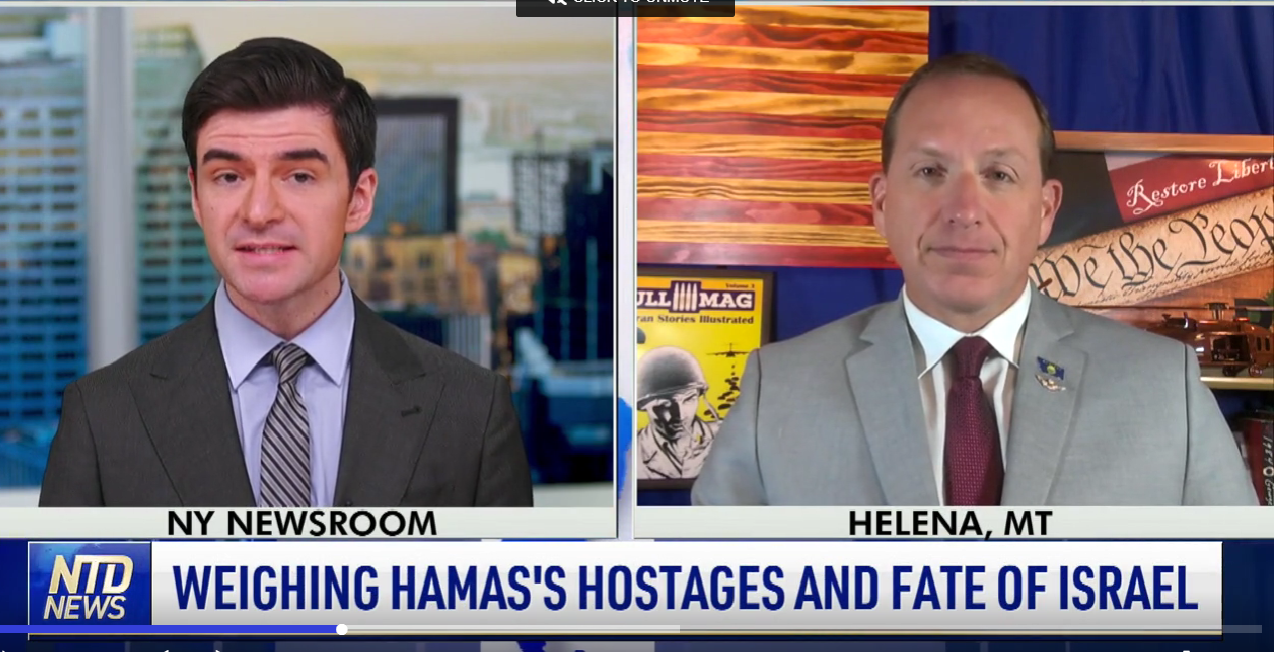As the world looks on horrified at Hamas holding hostages and threatening to torture and kill them and distribute the footage of them doing vicious things to scare people, the conflict between Israel and Hamas terrorists is a highly unconventional war that threatens to spill out into other nearby regions and could have decades-long consequences for the United States of America if our U.S. military is brought into the mix.
With Washington DC currently without a leader of the House of Representatives after the removal of U.S. Rep. Kevin McCarthy last week- the situation gets even more curious about what the future looks like for Americans in this terrible situation that could quickly turn into a global conflict.
Many people wonder what Democrat Joe Biden will do, and one long-time military strategist and founder of a pro-US Constitution group reminds Americans that it is Congress who declares war.
NTD News dove into the question on Tuesday and hosted Darin Gaub, 28-year military veteran, national spokesman, and founder of Restoring Liberty, a nationwide grassroots organization focused on magnifying the importance of individual and state rights under the U.S. Constitution.
“What’s the likelihood the United States will get more involved in #Israel? NTD spoke with@Darin_Gaub, International Military Strategist and retired Lieutenant Colonel, about what Israel’s war on Hamas will look like,” they reported in a TWEET.
>>>>>>>>>>WATCH FOOTAGE OF INTERVIEW HERE<<<<<<<<<<
Lt. Col. (ret) Darin Gaub appeared on NTD news on Tuesday to talk about Israel’s counter-offensive after the massive Hamas terror attack early Saturday morning and discussed what America would need to see before getting into a more expanded war.
” This is a tough topic to be talking about for anybody, but I think we’re going to initially have to assess and look out for where they stop. Where does Israel stop? And I know they’re already bombing the Gaza Strip, but will they move in heavily with ground forces to clear the area? And essentially maybe even just recapture and own the Gaza strip, which is functioning as a terrorist base camp for Hamas; so that’s my biggest question of the day, and we need to be watching that because there’s some point they’ll stop. It’s just a question of where,” Gaub said,
Hamas has captured at least a hundred hostages. That affects the fighting that’s about to unfold in Gaza.
Yeah, this is one of the most challenging questions anybody would ever have to answer; you know, how do you make a value calculation for a nation based on the capture of 150 or so people?
You’re dealing with a nation constantly on the edge of an existential crisis and just national survival. They made it very clear and immediately decided that they would not make their decisions based on any kind of hostage situation. They will continue to do what they have to do as a nation.
That’s not an easy decision, and knowing Bibi, I suspect he will put the fate of Israel. First,” Gaub said.
Q: “The United States is sending the U.S. USS. Gerald R, Ford carrier strike group to the eastern Mediterranean in support of Israel. There. How does that affect thein the region?” the host asked.
A: “Well, if it’s just a presence, the only effect I could see it having is it might cost some pause in other nations or groups around Israel before they would take any action when looking at Syria, Lebanon into the locations that are near Israel potentially, as far ranging out to, to Iran.
And we can’t forget. You know, Russia is in Syria as well; that could be the limit of it, and that’s hopefully the limit. But if something escalates in Israel? Then the question will be, what do we, as Americans, do?
And frankly, that decision resides more in Congress than the White House,” Gaub said.
Q: “Now what would it take to pull the U.S. into this conflict militarily? And and how likely is that to happen?” the host asked Gaub.
Gaub responded:
“All the likelihood of it to happen. I think it’s dependent on who else gets involved and whether or not we can clearly define some national strategic goals in the process.
And then, if we do expand our footprint in this conflict, I go back to reminding folks that it’s not up to the president. It’s not up to the Department of Defense to make that decision.
America’s entry into the war is purely dictated Constitutionally through Congress. Where a deliberative body has to debate and declare war, and if they don’t do that. No action. We take it legal by our Constitution. So that’s what we have to do. First, and how one of the odds? I’ll give you the lawyer’s answer, I guess, and go with 50/50.”
